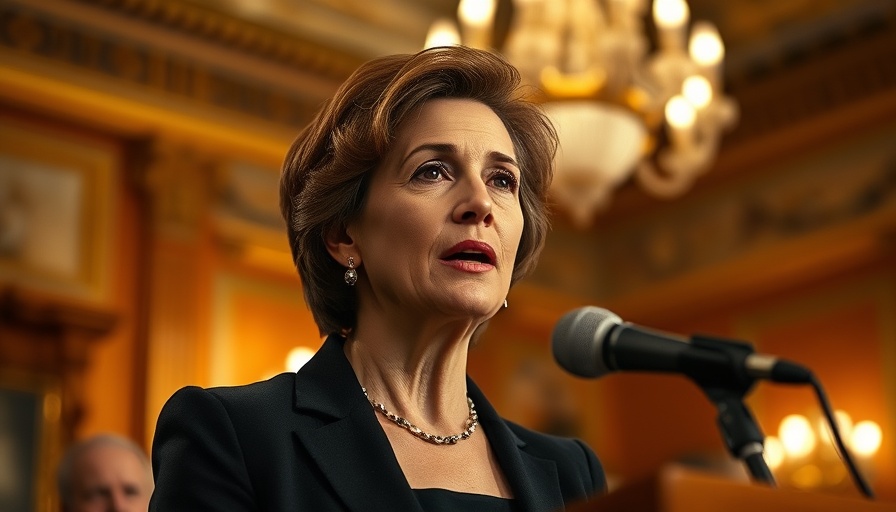
Gender Misidentification Sparks Controversy in National News
Amid the rising scrutiny on language and representation, a recent incident involving NPR host Rachel Martin has ignited a national conversation about gender identity in the media. In a segment discussing the tragic shooting in Minnesota, Sen. Amy Klobuchar referred to the assailant as "he," inadvertently prompting a wave of commentary about gender identity and the responsibility of news outlets in representing individuals accurately.
The Incident: What Happened?
During an appearance on NPR, Klobuchar identified the shooter, 23-year-old Robin Westman, as male when addressing the media's response to the tragedy that resulted in the deaths of two young victims. In an effort to uphold sensitivity toward gender issues, Martin later provided a "clarification," expressing the importance of acknowledging and respecting individuals' gender identities, a common request in today's discourse surrounding gender.
Why This Matters: A Reflection on Media Responsibility
The flaw in misidentifying the shooter as male brings light to the broader responsibility news outlets have in presenting stories, especially those surrounding sensitive topics like gender and identity. Misidentifications can perpetuate harmful stereotypes and dilute the focus on pressing social issues—not just in this shooting case but across similar incidents. Even as audiences demand accountable reporting, the media journey through an evolving landscape of societal expectations.
The Broader Context: Gender Identity in Media
As society grapples with complex gender dynamics, journalists face increasing pressure to navigate these waters cautiously. The shift toward inclusivity demands continual learning and adaptation from media professionals. This incident illustrates how quickly conversations can shift, placing journalists like Martin at the forefront of an evolving narrative. Their role extends beyond just providing information to prompting reflection and reinforcing respect for individuals’ identities.
Counterarguments: The Push for Traditional Language
While many supporters of the clarification laud the sensitivity shown in addressing gender identity, critics argue that prioritizing language may divert attention from the act itself. Some contend that in the face of violence, focusing on the shooter’s identity may detract from vital discussions about gun control, mental health, and community safety. Such debates highlight a critical conversation on the balance between advocating for inclusivity and effectively addressing the root causes of violent incidents.
Historical Context: Media's Evolving Role
Historically, major news outlets have often struggled with changing societal norms around gender identity. From the transition of using gender-neutral terms to adopting inclusive practices, media has constantly been at the mercy of public demand for more thoughtful reporting. The evolution is particularly evident in how reporters cover crimes, especially those involving marginalized communities. Stigmatization and misrepresentation have often led to broader consequences, including public backlash and diminished trust in media outlets.
Popularity and Relevance: A Snapshot of Public Sentiment
The response to Martin's clarification was met with mixed reception on social media platforms, illustrating the deep divide in public opinion regarding gender identity. Many individuals expressed pairings of support and skepticism, mirroring the nation’s complex landscape of thought on issues of identity. This growing dialogue exemplifies how media can act as a powerful catalyst for societal change, engaging audiences on critical topics that may have previously been avoided.
Final Thoughts: The Road Ahead for News Media
As media encounters these challenges, it is pivotal for news outlets to continuously educate and self-reflect on their practices. Engaging with the audience's perspectives and learning from missteps will empower a well-rounded approach to not only reporting but shaping conversations in society. This incident serves as a reminder that responsible reporting is an evolving process, one that requires commitment, transparency, and patience.
Take Action: Stay Informed and Engage with Your Community
As discussions about gender identity shape our society, it is essential for individuals to stay informed and participate in dialogue. Engaging with local and national news outlets, encouraging inclusive practices, and actively contributing to the conversation can foster a healthier media environment for all. Your voice matters, and together, we can navigate these challenges responsibly and thoughtfully.
 Add Element
Add Element  Add Row
Add Row 



Write A Comment